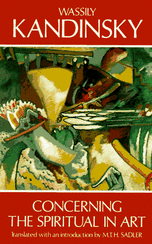 Wassily Kandinsky's Concerning the Spiritual in Art--a beautiful investigation of artistic thought—sets out to determine a criteria for creativity that will channel the spiritual into one's artwork. According to Kandinsky, an artist achieves the spiritual through 1) a balance of key choices in primary and secondary color relationships, 2) the use of shapes, lines, and points, and frequency of these elements to determine form, and 3) an understanding of proper hierarchies amongst these relationships to determine composition. Kandinsky is well-known for his color-sound synaesthetic condition. Is Kandinsky trying to understand the phenomenon of synaesthesia using the above criteria (whether he is a synaesthete or not)? For example, his theatrical compositions [like 'Yellow Sound'] combine musical arrangements with colored stage lighting, which overwhelm the senses. He produced these in the early 1900s [1909-1914?]. These experiments later inform paintings like 'Composition VIII' [1923] and 'Several Circles' [1926]. And as a result, become aesthetically pleasing displays of his visions, but not necessarily a universal language. UNIVERSAL (adjective): 1) done or experienced by everyone; existing or available for everyone. 2) existing or true at all times or in all places [ORIGIN: Middle English, from Anglo-French, from Latin universalis, from universum universe; first known use in 14th century] SPIRITUAL (adjective): 1a) of or relating to a person's spirit, 1b) of or relating to religion or religious beliefs, 1c) having similar views or ideas: related or joined in spirit. [ORIGIN: Middles English, from Anglo-French & Late Latin; Anglo-French espirital, spiritual, from Late Latin spiritualis, from Latin, of breathing, of wind, from spiritus; first known use in 14th century] |
ABOUT
This is my timeline of thought; a compilation of reminders, questions, inspiration and current events all which affect my creative energy. This blog intends to help strengthen my creative process and reassure my artistic self of a consistency in thought and familiar topics. [Definitions from Merriam-Webster Online Dictionary] ARCHIVES
August 2014
CATEGORIES |
 RSS Feed
RSS Feed